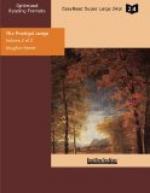“Hasn’t Norton any friends?” he demanded of Pegloe. “Who’s going to be safe at this rate? We want to let some law into west Tennessee, a hanging or two would clear the air!” His emotions became a rage that blew through him like a gale, shaking him to his center.
Two mornings later he found where it had been placed under his door during the night a folded paper. It contained a single line of writing:
“You talk too much. Shut up, or you’ll go where Norton went.”
Now the judge was accessible to certain forms of fear. He was, for instance, afraid of snakes—both kinds—and mobs he had dreaded desperately since his Pleasantville experience; but beyond this, fear remained an unexplored region to Slocum Price, and as he examined the scrawl a smile betokening supreme satisfaction overspread his battered features. He was agreeably affected by the situation; indeed he was delighted. His activities were being recognized; he had made his impression; the cutthroats had selected him to threaten. Well, the damned rascals showed their good sense; he’d grant them that! Swelling with pride, he carried the scrawl to Mahaffy.
“They are forming their estimate of me, Solomon; I shall have them on the run yet!” he declared.
“You are going out of your way to hunt trouble—as if you hadn’t enough at the best of times, Price! Let these people manage their own affairs, don’t you mix up in them,” advised the conservative Mahaffy.
The judge drew himself up with an air of lofty pride.
“Do you think I am going to be silenced, intimidated, by this sort of thing? No, sir! No, Solomon, the stopper isn’t made that will fit my mouth.”
A few moments later he burst in on Mr. Saul.
“Glance at that, my friend!” he cried, as he tossed the paper on the clerk’s desk. “Eh, what?—no joke about that, Mr. Saul. I found it under my door this morning.” Mr. Saul glanced at the penciled lines and drew in his breath sharply. “What do you make of it, sir?” demanded the judge anxiously.
“Well, of course, you’ll do as you please, but I’d keep still.”
“You mean you regard this as an authentic expression, sir, and not as the joke of some irresponsible humorist?”
“It’s authentic enough,” said Mr. Saul impatiently.
The judge gave a sigh of relief; he could have hugged the little clerk who had put to rest certain miserable doubts that had assailed him.
“Sir, I wish it known that I hold the writer and his threats in contempt; if I have given offense it is to an element I shall never seek to conciliate.” Mr. Saul was clearly divided between his admiration for the judge’s courage and fear for his safety. “One thing is proven, sir,” the judge went on; “the man who murdered that poor boy is in our midst; that point can no longer be disputed. Now, where are their fine-spun theories as to how he crossed to the Arkansas coast? What does their




